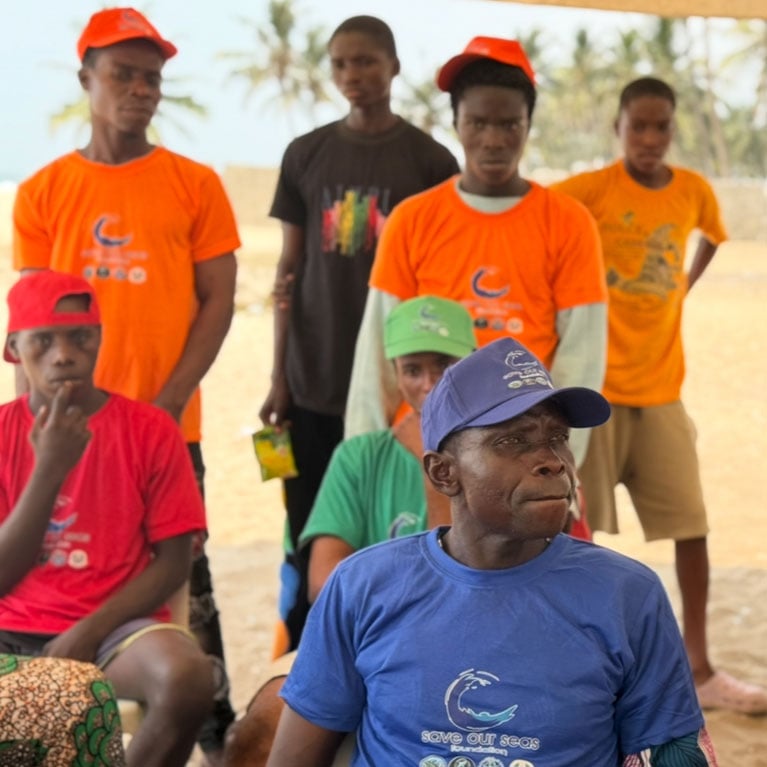Landing local ecological knowledge on hammerhead sharks in Nigeria
With more than 10,000 tonnes of sharks landed annually, the FAO has highlighted Nigeria as one of the world’s biggest shark-fishing nations. However, there is little in the way of scientific information, conservation effort or management strategies for sharks in the country. Lara wants to harness the local ecological knowledge of Nigerian fishers to understand how scalloped hammerhead sharks are being caught and traded, and ultimately help foster community-driven education and conservation efforts in the region.
As a passionate marine biologist, I study elasmobranchs so that the information I uncover can guide plans to conserve and manage these vulnerable species. I have always loved the ocean and its resources and am particularly fascinated by its megafauna. Fisheries feature prominently in my academic background: I obtained a Bachelor’s degree in fisheries at the University of Lagos and a Master’s degree in fisheries management, and I am currently a PhD candidate in fisheries at the same university. My research focused on the use of science, education and conservation to provide information that would improve knowledge...


Strengthening conservation efforts for the highly exploited scalloped hammerhead shark (Sphyrna lewini) in Western Nigeria
The main goal of this project is to improve the conservation status of the Critically Endangered scalloped hammerhead shark in Nigeria’s South-West region by collecting data on its biology; employing local ecological knowledge to learn about its past and present abundance and distribution, as well as harvesting and trading; and utilising community-driven conservation programmes to increase awareness of the need to protect it.
The scalloped hammerhead shark is assessed as Critically Endangered by the IUCN, yet in Nigeria’s South-West it is frequently landed as both targeted and incidental catches in artisanal fisheries. Although it is an endangered species, management measures for its protection in Nigeria are scarce. This project would provide the first comprehensive data needed by fishery managers to make informed decisions that would improve its conservation.
According to the UN’s Food and Agriculture Organization, Nigeria is one of the top shark-fishing countries in the world. More than 10,000 tonnes (9,842 tons) of sharks are landed in the country every year through target fishing and as bycatch. There is, however, little scientific information about sharks, and conservation strategies for these species in Nigeria are very limited. There are no species-specific records for the scalloped hammerhead shark Sphyrna lewini, which makes it difficult to assess present population numbers and catches in relation to those of the past and impedes efforts to develop any comprehensive conservation plan for the species. Currently, the scalloped hammerhead is assessed as Critically Endangered by the IUCN, indicating an extremely high risk of extinction. Based on a recent study identifying shark species in the South-West, the scalloped hammerhead comprises 18.27% of the total sharks landed. Anecdotal reports from retired fishers interviewed at some fish-landing sites in Lagos indicate that scalloped hammerheads are favoured as a catch due to the quality of their flesh for smoking, the high demand for their fins for use as surgical thread and their high export value. Consequently, an in-depth survey focusing on local ecological knowledge would help to provide insight into past and present trends in catch statistics and the trade route and socio-economics relating to this species. In addition, information about its growth pattern, reproductive cycle and exploitation rate is important. This project would provide the first comprehensive report on the status of the scalloped hammerhead shark in Nigeria and create much-needed awareness of the need to conserve it in the country’s waters.
- To collect information about the landing frequency, abundance, distribution and seasonality of the scalloped hammerhead and fishing operations and trade routes relating to it, both past and present, by investigating the ecological knowledge of local fishers.
- To evaluate aspects of the species’ biology, including growth pattern and reproduction, as well as its condition and exploitation in Nigerian waters.
- To conduct community-driven conservation programmes that would create awareness about shark protection and train young volunteers to collect long-term citizen science data on the scalloped hammerhead sharks in their region.

